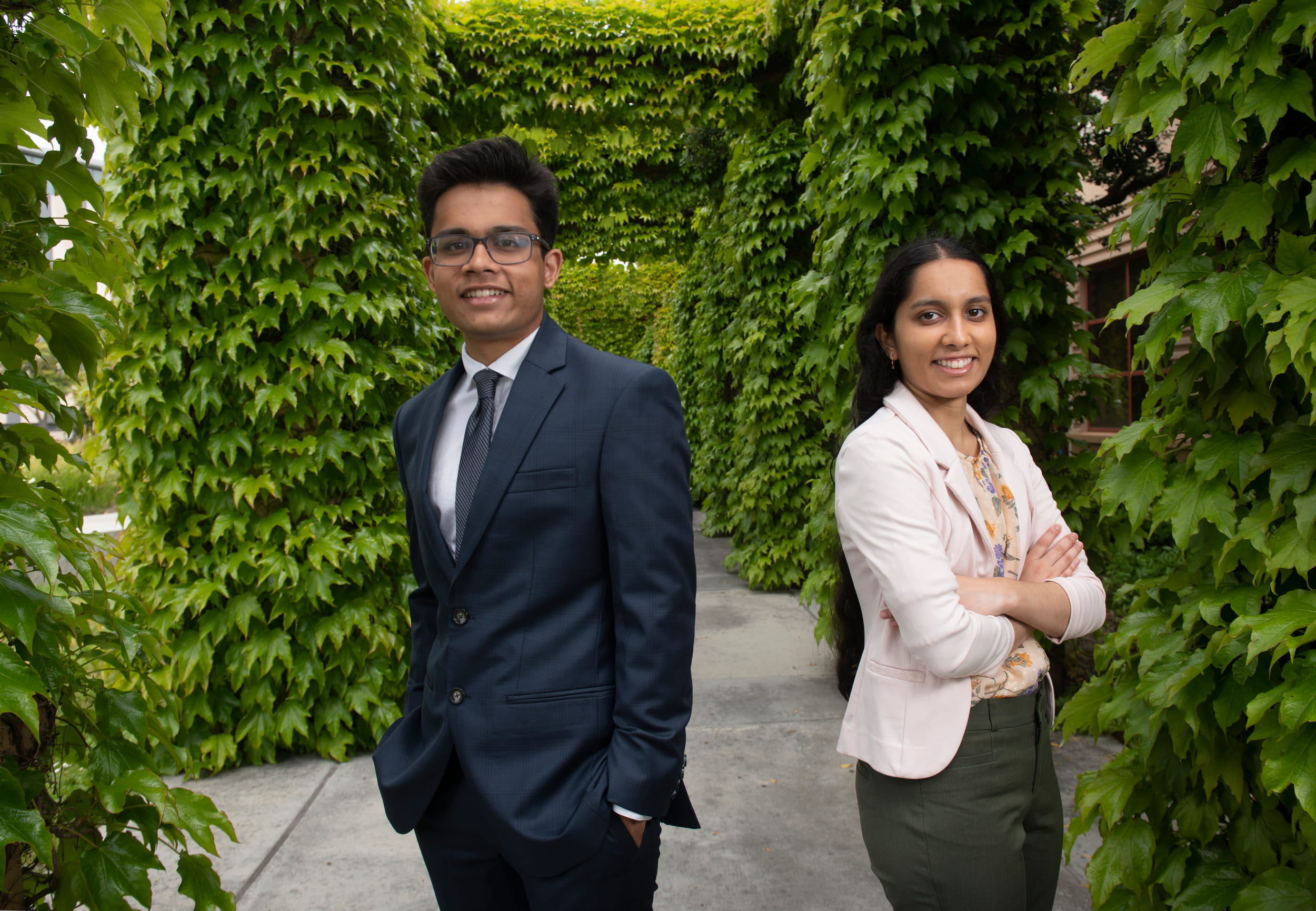Bringing emotional intelligence to artificial intelligence Leave a comment
Karishma and Pratyush Muthukumar play to each other’s strengths. Over the years, the siblings, UCI alumni, have tag-teamed many projects together, employing their respective expertise in cognitive science and computer science. Their current project: developing an empathetic chatbot for use in the medical field.
“There’s a lot of buzz around ChatGPT and similar language models that are coming out around this time, but we wanted to gear a chatbot specifically designed to consider empathy and compassion in responses,” says Pratyush Muthukumar, the younger of the pair. “Patients suffering from depression, anxiety or other mental health challenges might be able to talk with a chatbot that’s empathetic.”
He and his sister both graduated from UCI in 2022, Pratyush with a degree in computer science and Karishma in cognitive science.
She was invited by the United Nations to be a speaker at the AI for Good global summit in 2020, but it was delayed several years due to the pandemic. When organizers reached out again in 2022, she suggested a joint talk with her brother on their recent research together at UCI. Finally, the two Southern California natives will be making their way to Europe in July for a presentation on emotion-driven AI at the summit, in Geneva, Switzerland.
First encounters with AI
Karishma Muthukumar’s interest in artificial intelligence and its applications to the medical field was first sparked in 2014 when she joined the Children’s Hospital of Orange County’s Sharon Disney Lund Medical Intelligence, Information, Investigation and Innovation Institute. This was where she first learned about AI – specifically in the healthcare context. Soon, at just 15 years old, Karishma Muthukumar became the youngest person to win the distinction of best abstract in AI at the International Society for Pediatric Innovation’s annual Peds 2040 conference. In 2018, she was named “Young Innovator to Watch” at the Consumer Electronics Show for her medical innovation integrating emojis and AI to help paralyzed patients communicate.
During her time at UCI, Karishma Muthukumar earned the Donald A. Strauss Foundation’s prestigious public service scholarship, through which she founded the Patient Project. The organization promotes conversational care in hospital waiting rooms and senior facilities among caregivers, patients and relatives.
She sees the collaboration with her brother on empathetic, conversational AI as an extension of the work they both did at UCI.
“We actually took a computational biology class together, and that kind of summarizes the dynamic. That was a cross-listed course, so it had people from biology as well as computer science, and I found it was really great to be in the same classroom with him,” she says. “I think that illustrates the importance of a similar dynamic with artificial intelligence as well.”
Pratyush Muthukumar shares his sister’s belief in the value of taking an interdisciplinary approach. He notes that because AI is an evolving field, it’s difficult to predict what will happen with it.
“I think that right now we’re seeing a trend of open-source language models being made available to the public,” he says. “In the future, I hope to see a lot of explainability and transparency – more growth on how we can all understand the thought processes behind how these models are made. I hope that empathy and compassion will be included as major aspects behind that explained rationale.”
Pratyush Muthukumar completed his undergraduate studies at UCI last year at just 18 years old. Currently, he’s at Stanford University – supported by a National Science Foundation Graduate Research Fellowship – completing a master’s program in computer science, specializing in AI. During his undergraduate studies, he earned the Barry Goldwater Research Scholarship and conducted a project on using generative adversarial imitation learning to produce empathy-based AI.
“Now that AI is moving toward connecting humans together and there’s a lot more human interaction with AI, I think it’s important that when people are developing these types of models, the empathetic aspect is being taken into consideration,” he says.
AI for good
The Muthukumars’ empathy-based chatbot is the embodiment of AI for good. UCI continues to play a part in its growth, with the siblings working on deep learning models with Pramod Khargonekar, vice chancellor for research, and Deepan Muthirayan, a postdoctoral scholar in electrical engineering and computer science. As such technology evolves, Karishma Muthukumar reflects on the urgency of understanding the real-world impact of both AI on society and society on AI.
“I think it’s really helpful to have a dialogue surrounding AI and see what kind of elements we want to incorporate as a society I think about this question often – of how our voices can do good and how we can influence AI specifically,” she says. “If we think about it, we began in an analog world and then we moved to a digital world. And now we’re moving into an AI world. So how do we want to shape that? That’s something that we, as a society, are collectively thinking about and deciding.”
If you want to learn more about supporting this or other activities at UCI, please visit the Brilliant Future website at https://brilliantfuture.uci.edu. Publicly launched on Oct. 4, 2019, the Brilliant Future campaign aims to raise awareness and support for UCI. By engaging 75,000 alumni and garnering $2 billion in philanthropic investment, UCI seeks to reach new heights of excellence in student success, health and wellness, research and more.



